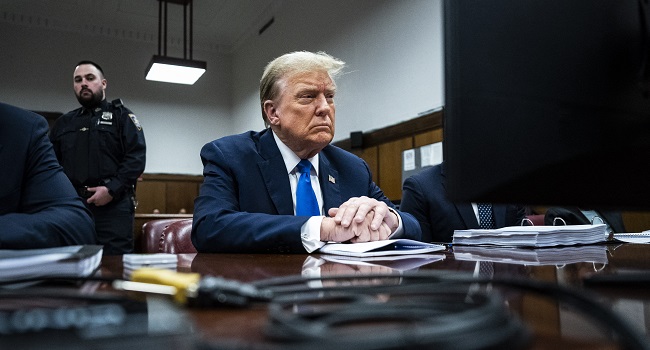Donald Trump, president-elect of the United States, was sentenced to an unconditional discharge on Friday for covering up hush money payments to adult film star Stormy Daniels. The decision spared him prison time or fines despite his conviction in May 2024 on 34 counts of falsifying business records, which carried potential jail time.
In presiding over the case, New York Judge Juan Merchan described the circumstances as unprecedented. “Never before has this court been presented with such a unique and remarkable set of circumstances,” Merchan said. “The only lawful sentence that permits entry of a judgment of conviction without encroaching on the land’s highest office is an unconditional discharge.”
Trump’s reaction
Trump attended the sentencing virtually, appearing on courtroom screens with two U.S. flags behind him, wearing a red tie with white stripes. In a brief statement before the sentence was passed, he described the ordeal as politically motivated.
“This has been a very terrible experience. I think it’s been a tremendous setback for New York and the New York court system,” Trump said. “It was done to damage my reputation so that I would lose the election.”
The sentencing
An unconditional discharge — a measure that upholds the guilty verdict but imposes no sanctions or restrictions — is considered rare. It allows the judgment to stand without penalizing the defendant further.
Prosecutor Joshua Steinglass argued that Trump had engaged in “premeditated and continuous deception” to cover up illicit payments to Daniels before the 2016 election, which Trump ultimately won. “The verdict in this case was unanimous and decisive, and it must be respected,” Steinglass said.
The sentencing occurred just 10 days before Trump is scheduled to be sworn in for his second term as president. Efforts by Trump’s legal team to delay the hearing were rejected by both the New York State appeals court and the Supreme Court.
A historic first
Trump’s conviction marks the first time a former U.S. president has been found guilty of a felony. He could have faced up to four years in prison, but the court opted for leniency given the unprecedented nature of the case and Trump’s upcoming role as president.
“He’s sticking his middle finger at the judge, the jury, the system of justice, and laughing,” commented Bennett Gershman, a law professor at Pace University and former prosecutor, before the sentencing.
Public reaction
Outside the courthouse, Trump’s supporters displayed a massive banner with his name, braving high winds to show their loyalty. On the other side of the divide, anti-Trump demonstrators held a vigil with signs declaring “Trump is guilty.”
Trump’s lawyer Todd Blanche expressed strong disagreement with the prosecution’s remarks, while Steinglass criticized Trump’s repeated claims of a “witch hunt,” calling them damaging to public trust in the judicial system.
“This defendant has caused enduring damage to public perception of the criminal justice system,” Steinglass said.
Despite the legal battles, Trump’s victory in the 2024 presidential election was certified earlier this week, solidifying his return to the White House four years after his first term ended amidst the Capitol riots of January 6, 2021.
This case leaves a historic imprint, highlighting the intersection of legal accountability and political power in the United States.


